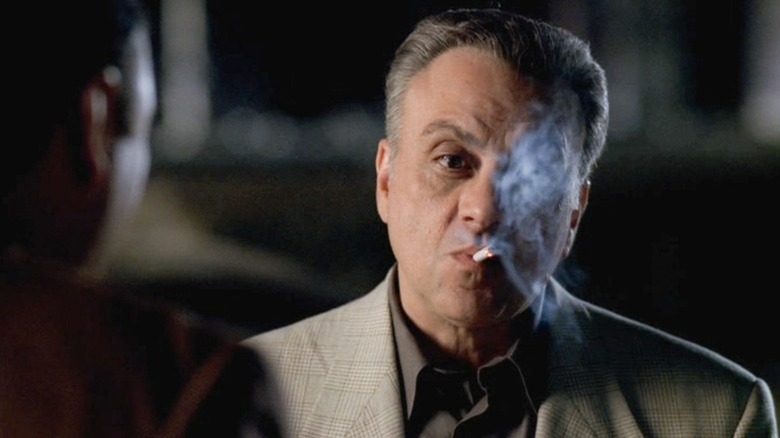The Sopranos Connection You Missed In Breaking Bad
When "The Sopranos" introduced TV audiences to New Jersey mob boss Tony Soprano upon its 1999 premiere, TV series were typically expected to feature protagonists that were likable or at least sympathetic. There were, of course, exceptions like "All in the Family," a 1970s sitcom that still manages to hold up today. At its center is Archie Bunker, an angry family patriarch with some aggressively regressive points of view who nevertheless functions as the series' beating heart.
Whereas "All in the Family" is a family comedy, "The Sopranos" is a family (of both the domestic and mob varieties) drama. "The Sopranos" can be comedic, but its stories far more often culminate in dramatic fashion, nearly every member of its core cast of characters perpetually prone to self-destructive impulses. Central to the recurring cycles of misery on "The Sopranos" is none other than family patriarch and series protagonist Tony Soprano. While Tony is occasionally on the receiving end of tragedy himself, he's far more often than not its instigator.
Nowadays morally compromised to outright villainous protagonists are frequently the subject of critically-acclaimed TV dramas thanks to the precedent set by "The Sopranos." Chief among entries in the burgeoning genre of TV series about difficult men is "Breaking Bad," one of the best TV series of the 2010s. Its very title refers to the gradual transformation of its protagonist Walter White from a milquetoast schoolteacher into a criminal mastermind that serves as its dramatic backbone. Most fans of the two series are likely unaware, however, that "Breaking Bad' pays tribute to its predecessor in "The Sopranos" in the name of one of its recurring side characters.
The two John Bags
Drug kingpin Gus Fring (Giancarlo Esposito, who recently appeared on "The Mandalorian") is perhaps the most memorable antagonist from the five-season run of "Breaking Bad." Gus' effectiveness as a villain is largely the result of his icy demeanor. It's Gus' combination of calm and intellect that allows him to masquerade as a restauranteur while illicitly dealing large amounts of drugs behind the scenes of his restaurant chain. As a result, Gus is as intimidating of a villain as any in TV history.
That said, Gus isn't without competition. The Salamanca family, itself a part of the Juárez-Michoacán Cartel, is occasionally allied with and more often at odds with Gus' drug operation. Due to the shared nature of the respective businesses of Gus and the Salamancas, the Cartel employs an intermediary who often acts as the go-between for communications between the two drug operations. That intermediary's name is Juan Bolsa (via the Breaking Bad Wiki).
Translating Bolsa's last name from Spanish (via Nglish) and transliterating his first name into its English equivalent results in the name John Sack. In The Sopranos, this is, of course, the name of the New York Lupertazzi crime family boss John Sacrimoni, known more commonly by his nickname "Johnny Sack." Not only are the names of the two gangsters similar, but even Bolsa's role is like that of Johnny Sack's in "The Sopranos." Whereas Bolsa is responsible for relations between Gus and the Salamancas, Johnny Sack, upon his first appearance, is the member of the Carmine Lupertazzi-led crime family closest to quasi-rival boss Tony Soprano. "Breaking Bad," then, appears to be discreetly paying direct tribute to one of its TV predecessors without distracting too heavily from its own narrative.

